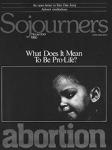One helpful way to deal with the question of abortion is to begin on the personal level. For me that means to deal with the question, "What does God want of me in this situation?"--this situation of active heterosexual lovemaking. To speak about the right and wrong of abortion in my life once I am already pregnant is like talking about the morality of nuclear war after the missiles are fired--a bit late, and very hard to think clearly. The question of abortion, I think, begins with the question of responsible sexuality.
Our culture has moved from a horror of sexual intercourse as something gross and degrading, an evil mitigated only by its purpose of procreation, to a demand for free sexuality exercised for the pleasure of it and without any connection with childbearing. I believe that both extremes are oppressive to persons, especially to women.
Scripture treats the "knowing" of one another by a man and a woman as both the expression of a unity already achieved and the pledge of a greater one to come. Responsible use of sex in the Christian life builds and deepens the union between two people, bringing them to a greater understanding of the underlying unity of all humanity and to a sense of the wonder and joy of creation.
The joy of creation; the joy of two people who love; the child conceived--the child is the natural outcome of lovemaking between man and woman. Responsible sexuality must somehow take that into account, not to make it a requirement but to recognize likely results. We are responsible, I think, for limiting the number of conceptions in the safest and most equitable way possible. For us sexuality is not only a celebration of the love given us; it is also an opening to the Spirit. Birth control (even vasectomy and tubal ligation) is never completely effective. There is always a chance of conception regardless of our intent. It is at that point that the Spirit of life can put our careful plans aside and say "not that, but this," or perhaps "that, but this too." It is here that our desire to be open to the Spirit comes into conflict with our wish to carry out our own plans.
We as Christians must be willing to limit our sexual activity to those situations in which we would be willing at least to bear a child to term and see it responsibly cared for should a pregnancy result. Otherwise we who are told not to kill will be in the position of cutting off potential human life. When our usual reasons for considering abortion are measured against the Sermon on the Mount, they look pretty paltry. Christ's dictum is that we should do God's will and all we need will be provided to us. The hardest times can bring the greatest joy.
In the light of Jesus' teaching, I believe that all killing, including abortion, is wrong; however, judgment, the condemning of other people, is also wrong. We are under obedience to nurture life as God's greatest gift to us. If we wish--as I do more and more--to take a public stand on this issue, then I think the route of legislation and constitutional amendments is the way of death. It is not for us to judge women who feel compelled to choose abortion. I would propose instead that first we put our own house in order, looking at our own relationships and at the children who may come (or may have come already) from these unions. Men especially need to be taking their share of responsibility, from contraception to the raising of the children.
A second step would be to share responsibility for the children we know, to help parents in our neighborhoods and communities by giving time and, if necessary, money, sharing the burden of child-rearing. A third step would be to take responsibility for those children whom we don't yet know, offering nurture and help to parents who cannot cope, support to women in difficult pregnancies, shelter and care to families in distress.
We can be sure of the absolute that killing is wrong, but we cannot judge the hearts of human beings; none of us has kept the commandments perfectly, and in our world the question of abortion is an agonizing one, borne almost entirely by women whose lives are made more difficult in every way by our society's bias against them and against life, old and new. I think that the solution we can offer to that question is the same solution offered to other problems: communities based in faith and prayer that resist death and nurture life, communities that make alternatives possible for women who now see only one solution.
Shelley Douglass, a freelance writer and speaker, was a staff person at Ground Zero Center for Nonviolent Action in Bremerton, Washington, when this article appeared.

Got something to say about what you're reading? We value your feedback!
